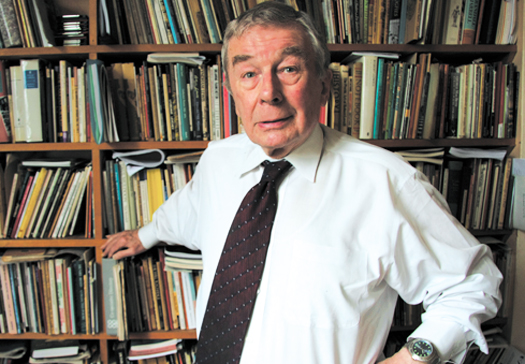Alan Brownjohn, award-winning poet who joined the defence of our threatened libraries
Poetry Society pays tribute to its former chair Alan Brownjohn, the man in the purple suit
Monday, 11th March — By Dan Carrier

Alan Brownjohn
DRESSED in a purple suit and ready to wage conversational battle, poet Alan Brownjohn, who has died aged 92, was a much-loved fixture at Poetry Society events.
He could hold court on any topic, the product of a lifetime of curiosity combined with a lifetime of honing his written and spoken words. It made him a powerfully eloquent presence.
Alan was born in Catford, south London, in 1931. His father Charles was a printer and his mother Dorothy was a housewife.
He was a studious and bookish child, and when air raids meant the family turned out the lights, Alan would head into the garden to read by moonlight.
He would later conjure up memories of his childhood in his fourth novel, Windows on the Moon, a historical fiction set in the famously cold winter of 1946/47 which he recalled as “the most vivid climatic event in my lifetime”. Alan studied at Brockley County School and won a place at Merton College, Oxford, to study history.
He had twin careers: as well as writing poetry and novels, he also taught. He held posts at Beckenham and Penge Grammar School from 1958 to 1965, Battersea College of Education and the Polytechnic of North London. A journalist and critic, he edited the poetry pages for the New Statesman and enjoyed 20 years as the Sunday Times poetry critic.
He won the Cholmondeley Award in 1979 and also scooped the Authors Club prize in 1990 for his novel about stand-up comics, The Way You Tell Them. He married the writer and poet Shirley Toulson in the early 1960s and the pair were elected to Wandsworth Council for the Labour Party in 1962. He also stood for Labour in the 1964 general election, but failed to win the seat of Richmond. Alan settled in to Belsize Park in the early 1970s.
He was a loyal supporter of the Belsize Library and was a member of the Camden Public Library Users Group, a campaign set up to protect libraries.
He campaigned against plans to cut back on library spending by the council under a Lib-Dem and Conservative coalition running the Town Hall in the 2000s – and then carried on the fight when a new Labour administration sought to hive off the management of three branches. Camden could say it hadn’t closed the libraries when volunteers stepped up to take them on.
Alan had once told the New Journal: “The heart of any library is the large well-stocked space where the public may peruse and borrow books, or sit and study them, and experience a quiet they cannot find in the world outside, often not even at home.
It is unbelievable that any servant of a responsible council should threaten these last havens of quiet.” He added that libraries were a “cornerstone of a civilised society, a depositary for shared knowledge that anyone could access for free, a barometer of a community’s health”. To help library supporter groups, he was a keen contributor to poetry readings at Swiss Cottage library.
Alan became the chair of the Poetry Society in 1982 and remained a keen and diligent member.
The society’s Judith Palmer recalled how he became a much loved fixture. “He would come in all the time and was always a really good friend to the organisation,” she said.
“He would never pass up the opportunity to come to a party. We used to take it for granted he would show up in a purple suit – and he had such a variety of purple suits to chose from.
“You’d have a party and there would be people wearing navy blue and black – and then there was Alan. He was a ray of sunshine, always radiant and vibrantly attired.”
Alan was determined to share his love of words with others.
“He was community-minded,” added Ms Palmer. “He was always encouraging activities and making things happen. People of all ages knew him and loved him.”
As well as a passion for English poetry, Alan saw language barriers as opportunities. He saw the importance of translations, promoted international voices and believed there was wealth to be mined in hearing global poetry. Poetry also should not be confined to the page, he believed.
“He wanted to share poetry that was good quality, interesting and needed to be performed,” added Ms Palmer.
“He did not want poetry to be purely academic. A lot of his work that was widely produced and highly praised was for young people, as opposed to the poetry aimed at an adult audience.
“Younger people cite him as a real influence and show he was active across generations. All the knowledge he had collected, all the people he knew – he was so good at sharing that, he was a great conversationalist. He could talk about such a wide range of things.”
Alan’s own poetry was influenced by the guiding principles of rationalism, democracy and humanity, formed by his early work with the poetry circle The Group, organised by fellow poet Philip Hobsbaum.

